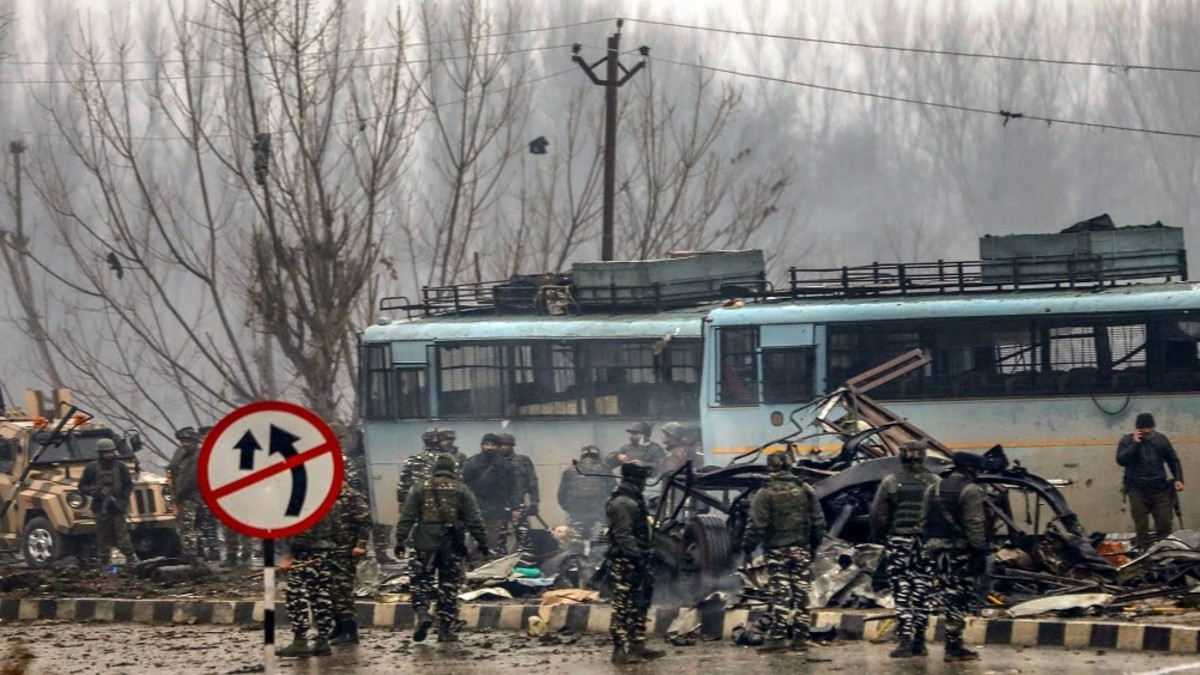The Pulwama attack in 2019 remains one of the darkest days in India’s tryst with terrorism.
A devastating suicide bombing on February 14, 2019, targeted a CRPF envoy, resulting in the loss of 40 brave soldiers.
The attack was planned by the Pakistan-based terror outfit Jaish-e-Mohammad (JeM).
Additionally, it caused tensions between India and Pakistan to escalate dramatically.
Today, as we mark the sixth anniversary of the brutal terror attack, here’s a detailed look at what happened and how India responded.
The Pulwama attack
On the afternoon of February 14, 2019, a Central Reserve Police Force (CRPF) convoy carrying over 2,500 paramilitary troops and 78 vehicles was moving along the Jammu-Srinagar National Highway.
Suddenly, 22-year-old suicide bomber Adil Ahmad Dar drove an explosive-laden car into one of the buses, triggering a massive explosion.
It was one of the deadliest attacks on Indian security forces in recent history, with 40 CRPF personnel tragically losing their lives .
Countries from all over the world, including the US, Russia, Australia, France, Saudi Arabia, Sri Lanka and Bangladesh, as well as the United Nations, condemned the brutal terror attack and offered India their assistance in the war against terrorism.
Jaish-e-Mohammad (JeM), a Pakistani terrorist group, was the mastermind behind the attack. Terrorists from Pakistan infiltrated India as part of a two-year-long operation.
Adil Ahmad Dar, the bomber, was a native Kashmiri jihadist from Kakapora, which is located in the South Kashmir region of Pulwama. He was a member of the JeM.
Mohammad Umar Farooq, the main conspirator, had gone to Afghanistan to train for explosives before sneaking into India to carry out the Pulwama terror attack.
A January 2019 Maruti EECO vehicle was modified for the attack and loaded with about 200 kilogrammes of premium explosives, including as gelatin sticks, aluminium powder, calcium ammonium nitrate, and RDX.
Masood Azhar, Rouf Asgar, and Ammar Alvi were among the JeM leaders who were involved in organising and leading the terrorist attack.
India launches Operation Balakot
In response to the Pulwama attack , India took decisive military action.
Twelve days later, on February 26, 2019, the Indian Air Force (IAF) launched a pre-dawn airstrike targeting JeM’s largest terror training camp in Balakot, located in Pakistan’s Khyber Pakhtunkhwa.
The airstrike, which was carried out by several Mirage 200 fighter jets, destroyed JeM’s Balakot training site, which was operated by Masood Azhar’s brother-in-law, Maulana Yousuf Azhar.
According to government sources, over 1,000 kilogrammes of bombs were thrown on JeM installations, killing close to 300 terrorists.
Code-named Operation Bandar, the highly successful operation was the first time since the 1971 war that the IAF launched an airstrike that crossed the Line of Control and entered Pakistani territory, penetrating 65 kilometres deep.
According to intelligence reports, JeM had additional planned attacks, but India’s airstrikes prevented them.
The dogfights
After India’s military response, tensions between India and Pakistan increased, and on February 27, 2019, IAF and Pakistan Air Force jets engaged in dogfights.
A Pakistani F-16 was successfully shot down by the Indian Air Force’s MiG-21 Bison, but the MiG-21 crashed across the border in the process.
The Pakistani military captured Wing Commander Abhinandan Varthaman.
In spite of the situation, Abhinandan remained remarkably composed. On March 1, 2019, he was released after Indian diplomatic pressure.
He received the prestigious Vir Chakra for his bravery.
Honouring the Martyrs of Pulwama
Today, the sacrifice of the 40 CRPF jawans in the attack is remembered with deep reverence.
On Friday, Prime Minister Narendra Modi paid homage to the CRPF personnel who lost their lives in the Pulwama attack.
“Homage to the courageous heroes we lost in Pulwama in 2019. The coming generation will never forget their sacrifice and their unwavering dedication to the nation,” he said in a post on X.
Union Home Minister Amit Shah also paid tribute to the 40 CRPF personnel killed in the attack. He said, “On behalf of a grateful nation, I pay my heartfelt tribute to the soldiers who were martyred in the cowardly terror attack in Pulwama on this day in 2019.”
He added that terrorism is the biggest enemy of the entire humanity and the whole world has united against it and that the Modi government is determined to completely destroy terrorists by carrying out a campaign with a “zero-tolerance” policy against them.
Over the past five years, the CRPF has undergone substantial transformations.
A senior official told Rising Kashmir, “The equipment at our disposal has significantly improved, and our preparedness ensures that terrorists face a strong response. Army convoy movements are now monitored through drone surveillance, and personnel are being transported in bulletproof bunkers to enhance safety.”
Moreover, he revealed that specialised training is being provided to Road Opening Parties (ROP) in alignment with modern security practices, and new SOPs have been put in place to avert potential attacks.
With inputs from agencies


)

)
)
)
)
)
)
)
)



